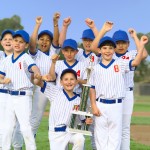 “How old should my child be to lift weights?”
“How old should my child be to lift weights?”
In working with a large number of youth, this is one of the more common questions I get from concerned parents. Urban legends of stunted growth, fractured growth plates, and prematurely inflated physiques have made parents, and society for that matter, reticent to involve youth in weight training.
The fact is, there is no scientific evidence to suggest that there is a perfect chronological age to start weight training. Research has not demonstrated any negative health consequences for weight training in youth, assuming proper movement is introduced and enforced concurrently with appropriate progressive increases in training load.
Despite what myths have been created around the subject, the current data suggests youth weight training injuries are primarily due to equipment accidents (weight falling on them, tripping in the weight room, etc.) or overzealous coaching rendering improper program introduction and progression.
Proper resistance training in youth has been demonstrated to improve fitness, favorably affect bone density, improve movement ability, and decrease the likelihood of athletic injury. Weight training is merely loaded movement. More simply put, it’s challenged movement. If basic movement becomes easy, we can challenge by adding something extra to continue to provide a training effect.
If a child can do a squat pattern perfectly for repetitions, holding a 2- pound medicine ball adds additional load. Once they can overcome this load with proper movement, they can hold a 4- pound ball. All semantic hubbub aside, this is weight training. One doesn’t have to be lifting barbells and dumbells to be training with weight. If a child can’t do a squat pattern perfectly, adding additional load would make no sense. They have demonstrated they do not need any additional challenge. The movement pattern itself has provided enough load.
The critical questions in regards to youth and weight training become:
1. Are they able to focus on the proper execution of task?
2. Are they able to execute and repeat an unloaded task with proper movement and cadence?
3. Are they mature and coordinated enough to respond to coaching cues?
4. Are they interested in weight training?
5. Is the person in charge of their program experienced and knowledgeable about movement and progression?
If the answer to any of the above is “no” it doesn’t matter the age of the human, they are not ready for weight training. In this case, I would focus on merely learning how to move properly through a variety of movement patterns without additional challenge or load.
The best answer to “When should my child begin lifting weights” is “when they need to.” When a child is able to focus on an organized training in which they execute and repeat all of the involved skills and drills correctly, add a challenge and slowly progress over time.
Brett Klika C.S.C.S., Director of Athletics at Fitness Quest 10 and founder of www.brettklika.com, is a world- renowned human performance specialist, motivational speaker, author, and educator. He uses this knowledge and experience to motivate individuals and audiences around the world through his writing, speaking, DVD’s, and personal correspondence. For more information and video on exercises, programs, and any other information on losing fat and creating the body you have always wanted, check out The Underground Workout Manual – Exercise and Fat Loss in the Real World at www.undergroundworkoutmanual.com.
 Subscribe
Subscribe

